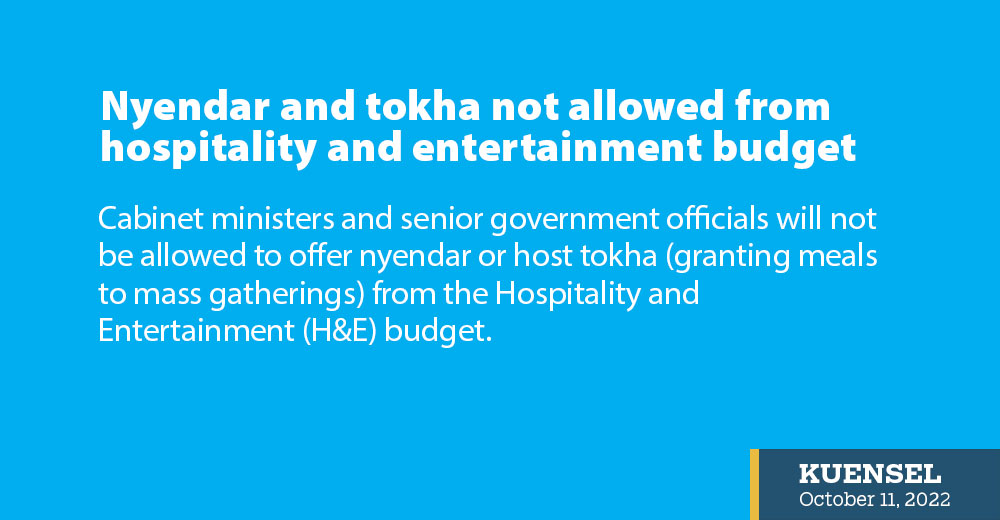Revised guidelines provide more clarity
Dechen Dolkar
Cabinet ministers and senior government officials will not be allowed to offer nyendar or host tokha (granting meals to mass gatherings) from the Hospitality and Entertainment (H&E) budget.
This is according to the revised guidelines for H&E. The finance ministry revised the guidelines for H&E after the Royal Audit Authority (RAA) asked the ministry to revisit the rationale behind the institution of the discretionary grant vis-à-vis H&E budget for prudent and judicious use of scarce public resources.
Ministries spent “unjustified expenses” amounting to Nu 9.8M on account of payments for soelra, nyendar, tshokchang, khaddhar, and semso from the H&E budget between 2016 and 2018, according to the Public Accounts Committee (PAC) report 2020.
Use of the H&E budget was one of the thrust areas of audit in the fiscal year 2018-19. The RAA report pointed out various inconsistent practices adopted in the use of budget by the government officials. The PAC report also states that in the absence of appropriate guidelines to regulate such expenditure, there is a risk of indiscriminate use and misappropriation of government funds.
H&E is defined as expenditure incurred on hosting, gifting and entertaining guests, including making other officials expenses during official tours and visits both within and outside the country.
There is no cap on expenses like donations, offerings, semso, tips, soelras and nyendar as they were discretionary in nature.
The new guideline
The revised guidelines are to provide clarity on the allowable and disallowable expenditures under the H&E expenditure, provide clarity to the oversight bodies and standardise the procedural requirements and restrictions governing the manner and extent to which public funding may be expended.
According to the guideline, expenses for hospitality and entertainment must be directly related to, or associated with, the active conduct of official business.
For instance, contributions to trust funds, charity and political party offices are also not covered under H&E budget. However, chagyebs will be allowed only while representing the organisation or agency at the annual kurims and rimdos.
The guidelines state that only actual and evidenced costs can be reclaimed based on the expenses supported by receipts, bills, invoices, and cash memos verified by public servants concerned.
The budget for the H&E for cabinet ministers and equivalent position holders will be within the prescribed ceiling of Nu 1.5M per annum. However, if it is not sufficient, approval has to be sought from Lhengye Zhungtshog with appropriate justification.
Nu 1 million for travel
Cabinet ministers and equivalent position holders are entitled to Nu 1M for travel purposes both in-country and ex-country. This amount will be adjusted from annual block grants allocated to respective ministries or agencies.
In the event the allocated amount is not enough to suffice the expenses incurred during official travel, respective ministers and equivalent position holders could meet the expenses from the H&E (provided the H&E expenses remain within the prescribed ceiling).
Any unutilised fund at the end of the financial year will lapse.
For the purpose of the guidelines, the discretionary grant will be defined as a grant to cover expenditures made at the discretion of an entitled public servant in their official capacity. The discretionary grant will be disbursed as and when required, upon receipt of a request for disbursement verified by the public servant concerned.
If a public servant gets transferred or remits from service before the financial year, the public servant will have to refund the discretionary grant on a pro-rata basis. The guidelines will apply to all public servants entitled to the H&E and the discretionary grant.


